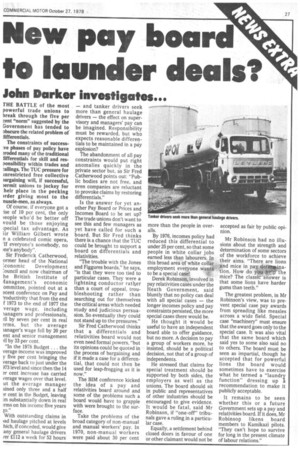New pay board to launder deals?
Page 29

If you've noticed an error in this article please click here to report it so we can fix it.
John Darker investigates...
THE BATTLE of the most powerful trade unions to break through the five per cent "norm" suggested by the Government has tended to, pbscure the related problem of differentials.
The constraints of successive phases of pay policy have eroded many of the traditional lifferentials for skill and responsibility within trades and • :.allings. The TUC pressure for inrestricted free collective )argaining will, if successful, )ermit unions to jockey for :heir place in the pecking )rder giving most to the nuscle-men, as always.
Of course, if everyone got a ise of 10 per cent, the only )eople who'd be better off vould be those enjoying ;pecial tax advantage. As >ir William Gilbert wrote n a celebrated comic opera, 'If everyone's somebody, no )ne's anybody".
Sir Frederick Catherwood, ormer head of the National conomic Development :ouncil and now chairman of he British Institute of 4anagement's economic ommittee, pointed out at a ecent conference on Pay and 'roductivity that from the end f 1973 to the end of 1977 the verage wage, including lanagers and professionals, ?.11 by seven per cent in real arms, but the average ianager's wage fell by 20 per ent and senior management dl by 33 per cent.
"In the 1978 Budget . . . the verage income was improved y five per cent bringing the verage back to just under the )73 level and since then the 14 er cent increase has carried verage wages over that level. ut the average manager ained only three and a half cent in the Budget, leaving im substantially down in real rms on his income five years — and tanker drivers seek more than general haulage drivers — the effect on supervisory and managers' pay can be imagined. Responsibility must be rewarded, but who expects reasonable differentials to be maintained in a pay explosion?
The abandonment of all pay constraints would put right anomalies quickly in the private sector but, as Sir Fred Catherwood points out: "Public bodies are not free, and even companies are reluctant to provoke claims by restoring differentials."
Is the answer for yet another Pay Board or Prices and Incomes Board to be set up? The trade unions don't want to see this and few managers as yet have called for such a board. But Sir Fred thinks there is a chance that the TUC could be brought to support a board on differentials and relativities.
"The trouble with the Jones and Figgures boards," he says, "is that they were too tied to particular cases. They were a lightning conductor rattler than a court of appeal, troubleshooting rather than searching out for themselves the critical areas which needed study and judicious persuasion. So eventually they could not stand up to the pressures."
Sir Fred Catherwood thinks that a differentials and relativities board would not even need formal powers, "but its opinions could be quoted in the process of bargaining and if it made a case for a differential, that could not then be used for leap-frogging as it is now."
The BIM conference kicked the idea of a pay and relativities board around and some of the problems such a board would have to grapple with were brought to the surface.
Take the problems of the broad category of non-manual and manual workers' pay. In 1970, non-manual workers were paid about 30 per cent more than the people in overalls.
By 1976, incomes policy had reduced this differential to under 25 per cent, so that some people in white collar jobs earned less than labourers. In this broad area of white collar. employment everyone wantii"to be a special case!
Derek Robinson, involved in pay relativities cases under the Heath Government, said bluntly that no policy can deal with all special cases — the longer incomes policy and pay constraints persisted, the more special cases there would be.
He thought it would be useful to have an independent board able to offer guidance, but no more. A decision to pay a group of workers more, he insisted, should be a political decision, not that of a group of independents.
He stressed that claims for special treatment should be supported by both sides, the employers as well as the unions. The board should sit in public and representatives of other industries should be encouraged to give evidence. It would be fatal, said Mr Robinson, if "one-off" tribunals gave a ruling in a particular case.
Equally, a settlement behind closed doors in favour of one or other claimant would not be Mr Robinson had no illusions about the strength and determination of some sectors of the workforce to achieve their aims. "There are lions and mice in pay, 4,tina tion. How do y the mice? The classieahswer is that some lions have harder gums than teeth."
The greatest problem, in Mr Robinson's view, was to prevent special case pay awards from spreading like measles across a wide field. Special case "machinery" must ensure that the award goes only to the special case. It was also vital that the same board which said yes to some also said no to others. The board must be seen as impartial, though he accepted that for powerful lions the board would sometimes have to exercise what he termed a "laundry function" dressing up a recommendation to make it publicly acceptable.
It remains to be seen whether this or a future Government sets up a pay and relativities board. If it does, Mr Robinsop likens board members to Kamikazi pilots. "They can't hope to survive for long in the present climate of labour relations."
































































































































































